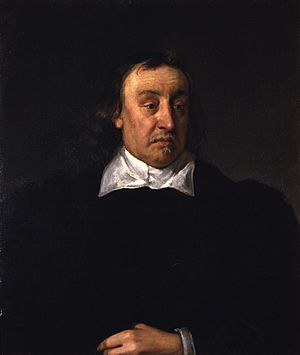Francis Prujean facts for kids
Sir Francis Prujean (born in 1593, died in 1666) was a famous English doctor. He was known for his medical skills and for treating important people, including the Queen of England. He also served as the president of the College of Physicians, which was a very important medical organization in London.
A Doctor's Life
Francis Prujean was born in a town called Bury St Edmunds. His father, also named Francis Prujean, was a rector (a type of church leader) in Lincolnshire. Young Francis was taught by his father before he went to Caius College, Cambridge. He started studying there in 1610. He earned his first medical degree (M.B.) in 1617 and a higher medical degree (M.D.) in 1625.
After finishing his studies, Prujean became a licensed doctor with the College of Physicians of London in 1621. He was then elected as a fellow of the College in 1626.
Prujean worked as a doctor in Lincolnshire until 1638. After that, he moved to London and set up his practice there. He became very active in the College of Physicians. He was elected as a censor (a supervisor) several times between 1639 and 1647. He also served as the registrar (who keeps records) from 1641 to 1647.
From 1650 to 1654, Sir Francis Prujean was the president of the College of Physicians. He was chosen for this important role because William Harvey, another very famous doctor, suggested him. Prujean also worked as the treasurer of the College from 1655 to 1663.
Sir Francis Prujean had many patients and was a very busy doctor. King Charles II recognized his great work and made him a knight on April 1, 1661. This meant he was called "Sir Francis."
In October 1663, Queen Catherine of Braganza became very ill with typhus fever. Sir Francis Prujean was called to treat her. She recovered, and many believed it was thanks to a special medicine he gave her.
A famous diarist named John Evelyn visited Prujean's home. He wrote about Prujean's amazing laboratory and his collection of paintings. Evelyn also mentioned that Prujean played a musical instrument called a "polythore." This instrument was a mix of a harp, a lute, and a theorbo.
Prujean also helped patients who needed support with their mental health. He cared for people who were described as having a "weak understanding" or mental challenges.
Sir Francis Prujean passed away on June 23, 1666. He was buried in a place called Hornchurch in Essex. A square near the Old Bailey in London was named Prujean Square after him. Samuel Pepys, another famous diarist, said that Prujean was a man of great wisdom, but sadly, he did not write any books about his medical knowledge.
His Family
Sir Francis Prujean was married two times. His first wife was Margaret Leggatt, who died in 1661. On February 13, 1664, he married his second wife, Margaret. She was the widow of Sir Thomas Fleming and the daughter of Edward Gorges, 1st Baron Gorges of Dundalk. Samuel Pepys noted that his second wife brought him a large fortune.
From his first marriage, Sir Francis Prujean had one son named Thomas Prujean. Thomas also became a doctor, earning his M.D. degree from Cambridge in 1649.
 | Dorothy Vaughan |
 | Charles Henry Turner |
 | Hildrus Poindexter |
 | Henry Cecil McBay |


